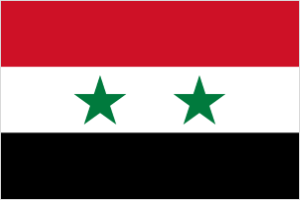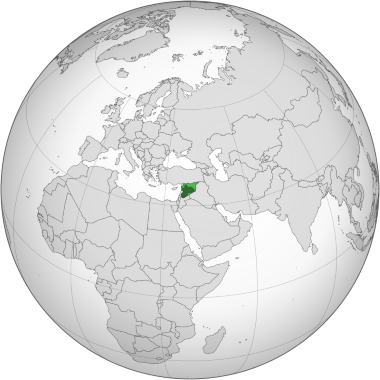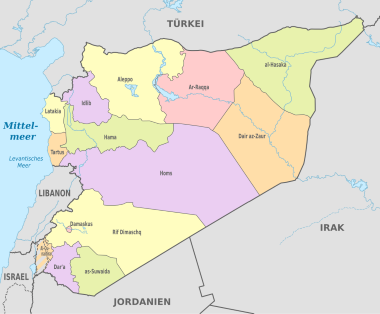
National flag - Wikipedia

View on Google

View Map
Syria is an acient land. Its capital, Damascus, is one of the world's oldest cities. Because of its important position on major trade routes, Syria ha been invaded and occupied many times - by the Romans, Arabs, Greeks, and Turks. After World War I, it came under French control, becoming independent in 1964. Since then Syria has been involved in several wars with Israel. Most Syrians are Muslism and speak Arabic. More than half of Syria is desert, but the river floodplains provide fertile land.
Palmyra: The rich and varied history of Syria is reflected in the many ancient ruins from past civilizations found scattered throughout the country. In the 3rd century AD, Palmyra, with its palaces, temples, and theatres, was a flourishing city, but it was destroyed by the Romans for refusing to give up its independence. It lies in an oasis on the edge of the desert, and is one of the best preserved ancient cities, in the world.
Market life: Markets, or souks, are held in villages and towns throughout Syria. The souks are lively, bustling places, with market stalls set out on winding alleyWays, selling anything from spices and vegetables, to carpets, jewellery, basketwork, and coffee pots. People come here to buy and sell, meet their friends, and-haggle (bargain) over prices. Souks are more than just trading centres, they are the central feature of the Arab way of life.
The Euphrates Dam: The Euphrates River flows through the northeast of Syria on its journey from Turkey to Iraq. A gigantic dam has been built across the river to harness the power of the water and produce hydro-electricity. Sharing the waters of the Euphrates is a big issue for Turkey, Syria and Iraq. A huge lake, Lake Assad was also created by the dam. Water from the lake is used to grow crops.
The Golan Heights: The mountainous area known as the Golan Heights was seized from Syria by Israel in 1969. It is important to the Israelis because it overlooks the Hula Valley in Israel, offering a good strategic position. It has been a major issue in past peace talks between the two countries bur the renewed Israel-Palestinian conflict since 2001 has left the issue unresolved.
Muslim Groups: The majority of Syrians belong to the tradirionally powerfil SUnni Muslim group. But there are other Muslim sects, such as the Shi'as, Ismailis, and Alawis. The Alawis believe not only in Islam, but in some aspects of Christianity. For example, they celebrate Chrismas and Easter. The Alawis were persecuted in the past, but many have now become rich and powerful. President Assad of Syria is himself an Alawis Muslim.